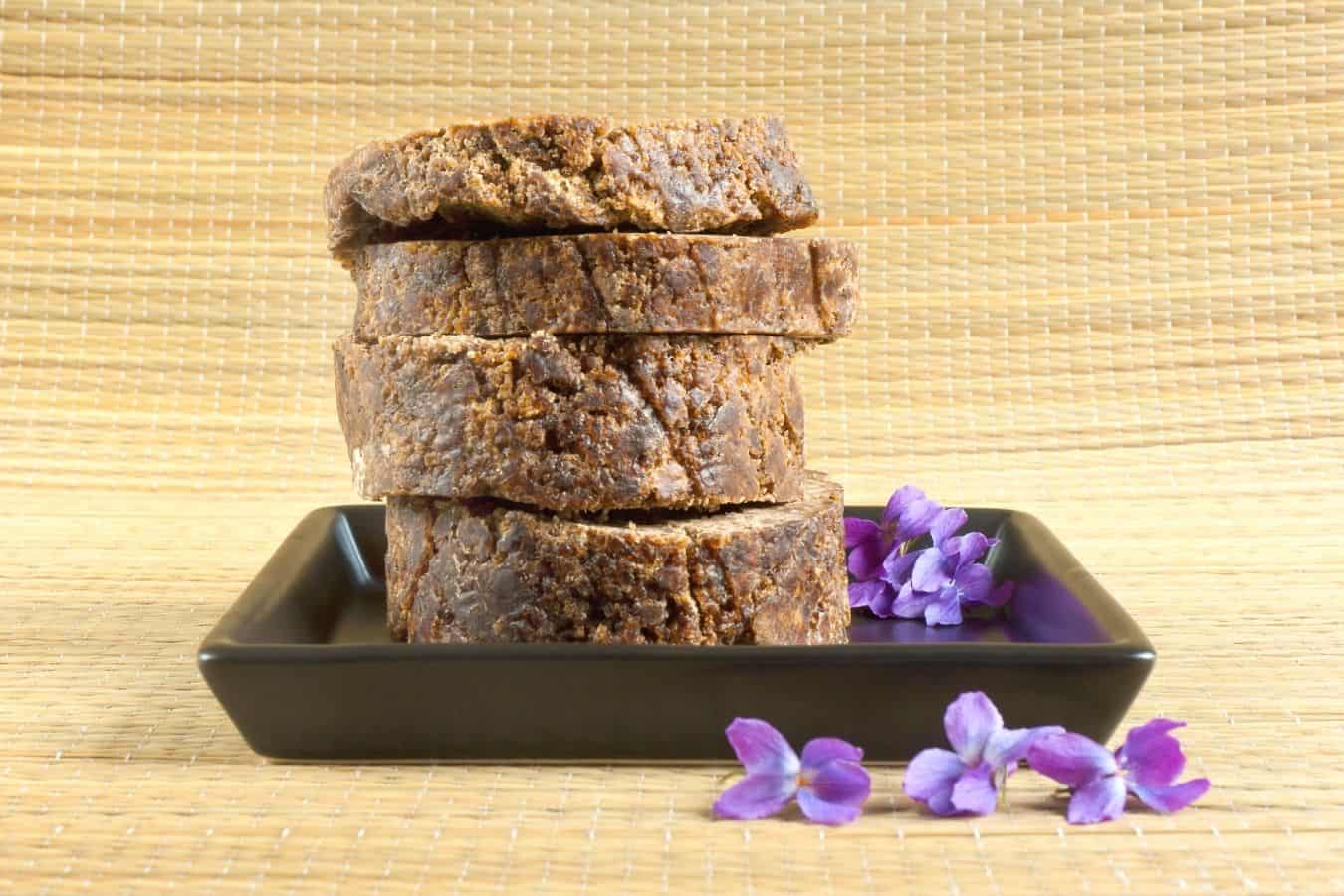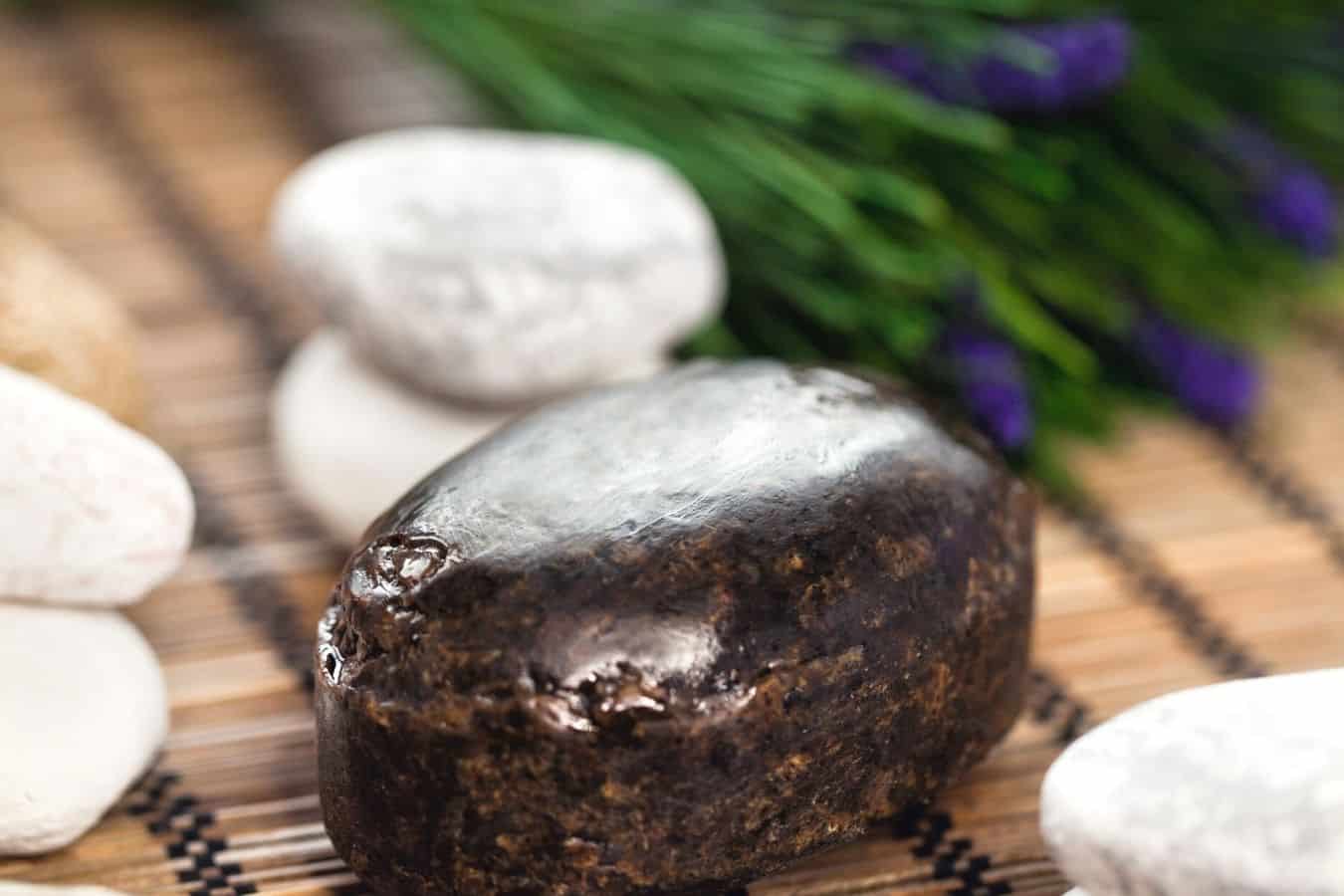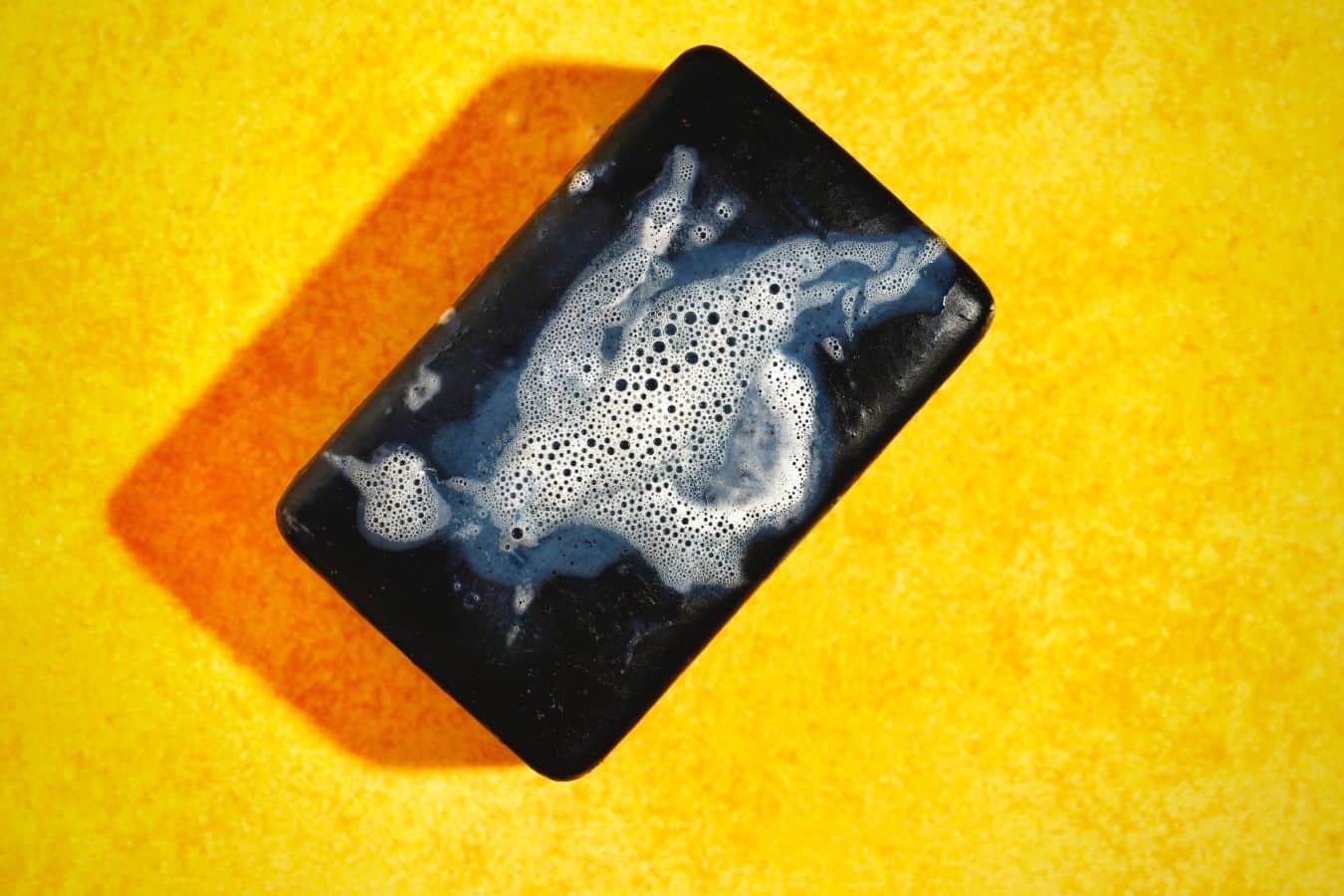African black soap has become one of the beauty and hair care industry’s better-known secrets, thanks to the many benefits that it purports to offer both skin and hair.

The benefits of African black soap are wide-ranging. They include:
- Aiding hair growth
- Prevent ageing
- Anti-bacterial, anti-fungal, and anti-inflammatory
- Moisturizes and helps to define curls
This article will outline what African black soap is, how it can be used, and even how to make some of your own.
This post contains affiliate links and we may earn if you click on them (at no extra cost to you). Please read our full disclosure policy here.
What Is African Black Soap?
With antibacterial, antifungal, and anti-inflammatory qualities, African black soap is a traditional hair remedy that comes from the Yoruba communities of West Africa.
As such, it’s known by a variety of different names, including ‘Ose Dudu’ and ‘Alata Samina’.
Its composition will vary depending on its origin, but typically African black soap is made from the ashes of cocoa pods, palm leaves, cassava, shea tree bark, and plantain skin.
These are mixed with all-natural ingredients palm kernel oil, coconut oil, and coconut butter, left for up to 24 hours, and heated to create a soap.
It’s a labor-intensive process that has traditionally been conducted by the women of countries like Ghana, Nigeria, and Togo.
These ingredients give it its dark-brown, black color as well as antioxidants and nutrients including vitamins A and E, magnesium, and potassium.
Because African black soap is entirely natural. It’s really popular amongst enthusiasts of all-natural beauty, as you’re not putting any chemicals or toxins onto your body through its use.
But be aware! There are a lot of fake African black soaps available. These these won’t give you the many benefits of the substance and may do more harm than good.
So, if you’re buying one, be sure to double-check its authenticity. Alternatively, check out our recipes for homemade African black soap.
What Is African Black Soap Used For?

African black soap is used for the hair in the following ways:
- It can help to maintain and support a healthy scalp
- It’s deeply cleansing and anti-fungal, qualities that, in turn, can help to promote hair growth, nourish hair follicles, and minimize dandruff.
- It’s moisturizing, helping to hydrate hair and soften strands. This will reduce any frizz and can make curly hair both more manageable and have greater volume.
African black soap is also widely used for skin concerns, and can help with the following:
- For sufferers of eczema, rosacea, or rashes, African black soap can be deeply soothing thanks to its anti-inflammatory qualities.
- People who experience acne also use African black soap as it’s anti-bacterial, and is therefore a natural solution.
- Because African black soap is so moisturizing, it will help to reduce the appearance of fine lines, stretch marks, and dark spots.
Benefits Of African Black Soap For Hair
1. May Help Hair Growth
If you’re after hair growth, African black soap might just help.
In order for your hair to grow, your scalp has to have a steady supply of blood circulating to it.
But build-up from excess oil, sweat, and dirt can disrupt the flow of both nutrients and blood to the hair follicle.
African black soap contains many antioxidants and vitamins like A and E.
Vitamin A in particular promotes the creation of sebum in the scalp. This helps to maintain a healthy level of moisture that keeps the follicle healthy.
Vitamin E can help to naturally reduce the impact of free radicals and oxidative stress, both of which can block the hair follicle.
African black soap is also deeply cleansing.
Its ingredients will vary depending on its origins, but some formulas contain oils like eucalyptus, whereas others may have aloe vera or oatmeal.
All of these boost the nutrient and mineral content of African black soap, helping to unblock the hair follicles. This may in turn lead to better hair growth.
2. May Be Anti-Ageing
Because African black soap is so nutrient-dense, it has some major anti-aging benefits.
Cocoa pods in particular have antioxidants like polyphenols which have been shown through some research to have anti-aging qualities.
3. Anti-Bacterial, Anti-Fungal, And Anti-Inflammatory
African black soap has long been used as a natural acne treatment as a result of its anti-bacterial qualities.
It’s also great for people who suffer from skin conditions like eczema or allergies. This is because it is all-natural and deeply soothing.
Similarly, if you experience dandruff, African black soap might just be your savior.
It will soothe and balance your scalp and strands, helping to naturally hydrate and thereby minimizing dandruff.
The cleansing qualities of African black soap are another reason why it may help with hair growth. It balances the scalp and unblocks hair follicles which encourages hair to grow.
4. Moisturizes And Helps To Define Curls
African black soap also has high glycerin and fatty acid content, keeping your scalp and strands moisturized, soft, and shiny – naturally.
This is thanks to ingredients including cocoa butter, coconut oil, and shea butter.
It can therefore help to better define your curls, keeping them hydrated without weighing them down.
DIY African Black Soap Shampoo Recipe
As we’ve already detailed, there are many counterfeit African black soaps available. Making your own is therefore a great way of knowing exactly what’s going into your formula.
You can use all of the below or customize the recipe according to what works for you.
Ingredients
- Bar of African black soap (about one ounce weight)
- 1 cup of distilled water
- 1 teaspoon of glycerin
- Apple cider vinegar (diluted, so as to rinse your hair)
- 1 teaspoon of vitamin E oil
- 1.5 tablespoons of jojoba oil
- Half teaspoon of argan oil
- 1 teaspoon neem oil
- 10 drops of tea tree oil
- 10 drops of rosemary oil
- 10 drops of peppermint oil
Method
- Depending on what’s available around you, you can use a grater or a butter knife to shave off around a third of your bar of African black soap into a jar or small bowl (make sure it’s airtight).
- Take your distilled water – it needs to be warm, so boil it in advance and leave to cool. Add this to the shavings of soap. Depending on your preference, you can use more or less water. Using more will give you a thinner solution, and vice versa.
- Allow the soap to dissolve in the water. Remember, the smaller the shavings, the faster they will dissolve. Then add all of the other ingredients, all of which have fantastic nutritional benefits for your hair and scalp.
- Gently shake the mixture until it’s well blended. Leave it for as long as it takes for the ingredients to fully combine.
- Once well-mixed, add the liquid to a bottle. You now have your African black soap shampoo, and you can use it as you would a regular shampoo. Massage it into your scalp and hair strands, and wait for the benefits.
- Once you’ve rinsed the shampoo out, use the apple cider vinegar in order to help balance your scalp’s pH (African black soap is very alkaline). Use cool water if you don’t have apple cider vinegar, and rinse the whole of your head.
- Then condition your hair as normal, and follow your usual haircare routine.
Also Read:
- 6 Benefits of Using Ghee For Hair (How To Use)
- Jojoba Oil For Natural Hair: 5 Benefits and How To Use
- How To Use Clove Oil For Hair – 3 Easy Ways
Any Side Effects Of African Black Soap?

As described above, African black soap is very alkaline – you can rebalance your scalp’s pH levels by using an apple cider vinegar rinse after using African black soap.
Similarly, some users of African black soap have reported dryness after using it. You can use a deep conditioning treatment following your use of the shampoo in order to restore hydration.
Always remember to patch test your African black soap before use. With the best will in the world, any product – even if it’s all-natural – can nonetheless sometimes cause reactions, so it’s better to be safe than sorry.
Top 3 Best African Black Soaps
Remember, when you’re looking to buy African black soap for your hair, you need to be looking for the real deal.
This will typically be soft and quite crumbly in texture (which is why it’s so easy to cut into small shavings in the above recipe).
It will tend to be multi-colored as a result of its various ingredients, having a mottled look and a textured feel. It will easily dissolve in water and is very malleable.
Fake African black soap is more like every other synthetic bar of soap. It’s brick-like and hard, with a smooth surface.
You’ll find it really hard to cut apart and it will neither mold nor dissolve in water easily.
Remember, as well as the below pure African black soaps, many companies – such as Shea Moisture – have created hair care products with African black soap.
From masks to cleansing shampoos, African black soap has been incorporated into all-natural haircare by a variety of retailers.
Below, we’ve chosen the three best pure African black soap bars.
Wonderfully Natural African Black Soap
The ingredients of this African black soap are all organic and include coconut oil, shea butter, palm kernel oil, and cocoa pod.
It will help to hydrate your skin and hair, intensely cleansing your scalp and strands and boosting your natural nutrients and minerals.
The soap follows a traditional recipe, and the company is African-owned and supports fair trade, so a portion of the sale of each soap goes to support the communities in Ghana who create the soap.
The glowing reviews are all you need to see to know that this African black soap means business.
Our Earth’s Secrets Premium Raw African Black Soap
Originating from Ghana, the ingredients of this African black soap include palm kernel oil, coconut oil, unrefined shea butter, ash from plantain skin, cocoa pod husk, and natural sources of vitamin E.
There are no artificial fragrances or ingredients and the soap is made following a traditional recipe.
This African black soap is the real deal, so you may find particles of the ingredients in it – as such, don’t rub it directly into your skin, but use a sponge, loofah or washcloth and lather it up.
This African black soap is two pounds worth, but Our Earth’s Secrets also do one pound and three pound soap bundles, depending on how much you need.
Incredible by Nature African Black Soap
Palm oil, palm kernel oil, coconut oil, unrefined shea butter, vitamin E, and plantain skin ash combine to make this African black soap.
It’s entirely natural and will work on both your skin and hair to intensely moisturize, soften, and deliver a boost of antioxidant goodness.
Lather up with a cloth or loofah and work it into your skin, or add to our African black soap shampoo recipe above.
Disclaimer: This site is not intended to provide professional or medical advice. All of the content on LovedByCurls.com is for informational purposes only. All advice should be followed at your own discretion. Ingredients may change at any time so always check the product label before using. Check our full disclaimer policy here.



